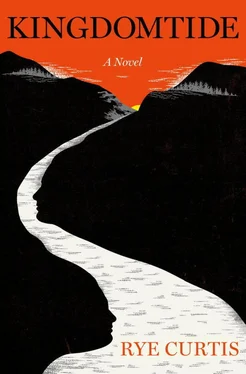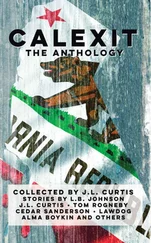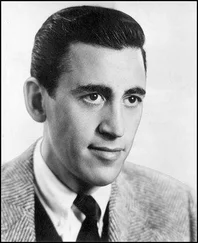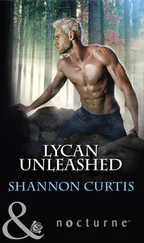But one night the young man decided he had to go beating on his wife. I heard the commotion and crept from bed. Mr. Waldrip did not wake. I went to the sitting room and from there I saw their shadows warring on their window blinds. I was not snooping. I am not one of these bug-eyed women who hardly does a thing but leans on a windowsill. Still I watched them from my sitting room for a good spell, quietly, like it were a shadow play.
Of course I had not heard what had been said between them, however the next morning that pitiful little Chihuahua dog was strung up by the wire in their porch light and the young couple had come up missing. The limbless animal swung dead there like a pendulum for a day or two before the mailman cut it down. I did not think to do it myself. That poor little Chihuahua dog! Often as not it is the helpless and the meek that pay the debts of others. Shortly thereafter the house was put up for sale and I never heard word of them again. I worried I had showed myself a big ole coward for not having acted in some way better than what I had, at the least to have spared that poor creature the indignity of swaying in the hot breeze like a windchime struck dumb. But I did nothing and told not a soul. I spoke of it only to God and it is unclear his opinion on the matter.
I thought about this young couple once out in the Bitterroot and teared up, not for them or their little Chihuahua dog, but for myself and those mighty cruel occasions on which I had been shown my awful lack of character. I fear I may be what psychologists call a narcissist. The very nice black therapist here at River Bend Assisted Living, Melinda, does not think so, but I do. Perhaps she simply does not know me well enough.
I had been in the wilderness for ten days now, and I had counted three days since I had found the mysterious note. I followed the creek down like the note had said to do until the creek became more what I would call a river. Far ahead it disappeared into a thick wood. It seemed this river could wind on into the depths of that wilderness without end.
Each night as darkness fell I would spot a flickering light ahead and soon find a fire burning and a fresh trout laid out on a log or a rock. I had gotten to where I could clean one well enough with the little black hatchet, but I sure made a mess of the first. I toted along the steel pot I had found the rabbit in, and every night I fried the trout in the bottom of it and scraped it up and ate it off the blade of the hatchet like a pirate from Robert Louis Stevenson’s Treasure Island .
One cloudy day more helicopters zoomed over to the big mountain where our little airplane had gone down. I counted three of them. They were blue and one was wide and very loud. I waved and hollered but it was no good. They could not see me. I went on down the river slow as a graveyard.
I do not imagine I made much more than four miles a day. Naturally I was younger then than I am now, but I was still an old woman and I was unaccustomed to traversing such difficult terrain, much less while carrying all that I was in my purse and in the pockets of Terry’s coat. The most Mr. Waldrip and I ever did was take a leisurely stroll after dinner, less than a mile out to the west pasture, where there was a polled steer cross-eyed and roped to a lazy old windmill. Occasionally kids would glue a corncob pipe in the poor creature’s mouth for mischief.
Miss Lauper’s song that Terry had sung prior to his passing rattled on stubbornly in my head. At the time, not knowing how the melody was meant to go, I only heard it in Terry’s broken plainchant: If you’re lost you can look and you will find me, time after time… You might suppose I would not want to hear that song ever again. But now that I have heard it performed by Miss Lauper I do not mind it, though it is not as musical as Ruth Etting’s “Crying for the Carolines” or most anything sung by Perry Como.
On what I counted as the fourth night of my journey downriver, black clouds covered the sky. The wind picked up and the smell of rain filled the air. There blinking ahead was another fire. I made some haste to it. It was burning hot and was hissing and sputtering as the first of the rain came. Nearby on a felled spruce lay a thin creature akin to a squirrel, cleaned and with little blood. Being special tired that day and not very hungry, I decided to hide best I could from the rain and eat the inscrutable creature in the morning.
The rain did not last all night, thank goodness, and I managed to keep the fire burning. At last the sun rose over the mountains, and the trees and the grass glittered and reminded me of the awful gaudy jewelry Catherine Drewer wore every Sunday to impress upon the congregation how well her pepperhead husband was doing in the oil business. I wrung out Terry’s coat and put my shoes out to dry. I got a stick and skewered the strange skinless creature I had been given and burned away its limbs and ate little of it. I kept the rest in the pot and traveled on downriver. After a while I was near in a trance. My body ached and like an old salt lick my head was not all there. I felt the way I had when Mr. Waldrip had taken me to the hospital for an endoscopy and a young nurse with old hands had given me some tablets the color of cream. I made little progress down the river that morning.
Afternoon came and the sun burned and insects chattered. Not the way they do in Texas, where it sounds like there are rattlers hanging in the mesquites. No, these insects in the mountains are more soft-spoken. All creation seems to whisper.
I do not hold any belief in devilment or magic, but those savage mountains had begun to work a kind of spell over me. As often as I looked to them on the horizon I could not for the life of me get familiar with them. They seemed to shift and collapse in the manner of waves on an ocean. Not long ago I watched a television program on the Public Broadcasting Service about the expedition of Lewis and Clark. I learned that a travel companion of theirs, Sergeant Patrick Gass, wrote that the mountains in the Bitterroot were the most terrible mountains he had ever beheld. I am inclined to agree with him.
I got mighty dizzy and lost my footing. I caught myself and climbed up on a rostrum of granite to get my bearings, but I went on being mighty dizzy for some time and then I was just plain ill. Unable to stand, I crawled on my hands and knees to the riverbank and splashed water on my face. I watched some little tadpoles go by and I was sick in the water.
I lay there and listened to the water play against the reeds and imagined I was listening to Mr. Waldrip run himself a bath after a day hunting with his friends Bo Castleberry and Bob Guffine. Mr. Waldrip was not one for showers. He liked to take his time in the tub and mull the day over. He would take his open palms to the water and perform a measure of percussion so distinctive I doubt I will ever hear the like of it again.
Shortly my feet were sweating and I had been sick three times. Heat filled my eyes the way it does when you have a fever, and I could have placed my hand on my Bible and sworn I saw Mr. Waldrip watching me from a nearby mott of spruce. I shut my eyes.
I got to wondering if it was not God that had led me downriver, providing my supper and building fires, but Satan himself. My gracious, I feared I had been led astray. Poisoned by the consumption of that unknown creature, some kind of wrong spider feline escaped from a demon’s kennel, ailed with an ague incubated by the malarial climate of hell itself. I knew I had not correctly atoned for my sins. Perhaps all that I had done poorly in life had sought me out and found me there at the end of a purposeless parable.
Now I ought to put down here some about Garland Pryle.
The trouble with Garland began at the grocery store his family owned. It was the only grocery in Clarendon at the time. He worked there in an emerald-green apron that matched the color of his eyes. He would have been twenty years old and I twenty-four. I had not been married very long to Mr. Waldrip and we were both of us still very young. I wish it were true for me to say that Garland lured me against my better judgment to his parents’ home one evening while Mr. Waldrip was in Colorado at a cattle auction. But this Cloris Waldrip will not dishonor the memory of her dear departed husband by dealing poorly with the truth. I will commit to this account that it was I who stole Garland aside one rare day of heavy rain and gripped him by the belt of his apron in an aisle of canned peas and begged him to take me home under his umbrella. I have always wondered if Mr. Waldrip knew what had happened somehow or another, and for whatever kind or pitiful reason just never said a word about it.
Читать дальше
Конец ознакомительного отрывка
Купить книгу










